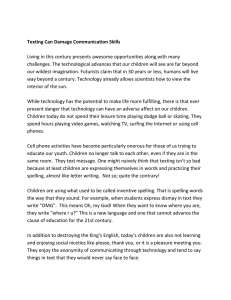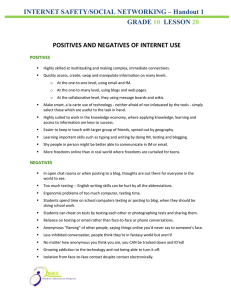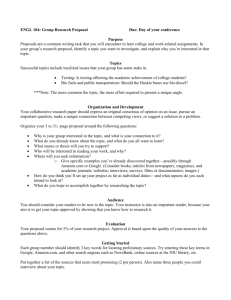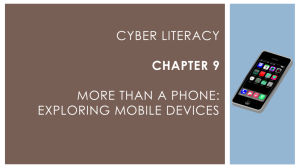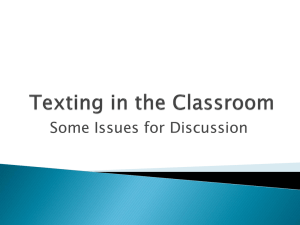Across the multifamily housing industry, policies concerning texting
advertisement
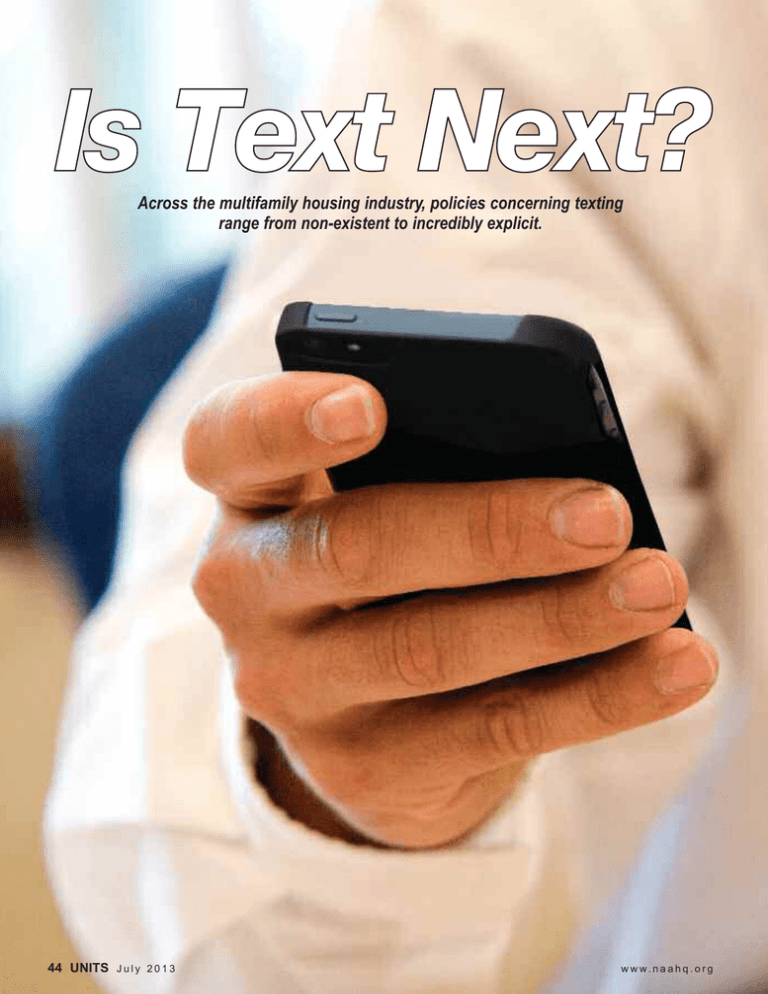
Is Text Next? Across the multifamily housing industry, policies concerning texting range from non-existent to incredibly explicit. 44 Units July 2013 w w w. n a a h q . o r g BY PAUL R. BERGERON III G iven the rapid pace for technological innovation today, wasn’t it only a matter of time before texting replaced email as the preferred method for on-the-job communications? It is, in fact, the matter of time. Today, many business people and onsite apartment staff find texting to be a more efficient and effective method for giving and sending information while on the job. An informal survey in June of approximately 50 NAA members through email (oops!) elicited varied responses about what are appropriate and acceptable uses for texting between colleagues or with clients. Most say texting protocol is not specifically and formally included in their companies’ employee handbooks. Of those who clearly address texting, employee safety, expense and courtesy were the most common focuses of the regulation language. Generally speaking, these apartment professionals say texting is not inappropriate during the workday, at least in certain situations or under some circumstances. And many say there is true momentum behind it becoming a primary or preferred communication channel. If nothing else, they say, it has replaced pagers, walkie-talkies and other older, onsite technologies. An Immediate Solution Texting is not simply a tonic for the highly impatient or over-caffeinated crowd. When questions can be worded briefly or when senders need only a short reply (such as one or two words, a number or a brief sentence), they say texting has proven to be a sensible and effective alternative to email, even if it must be typed with one finger or two thumbs. “We’ve all become so inundated by email that texting has become a good way to bring your issue to the top of the priority list,” says one asset manager. Alexandra Jackiw, CAPS, CPM, Managing Director, Residential Client Services, McKinley, whose company does not have a specific policy about texting, says that texting tends to be less disruptive. And given today’s management culture of urgency in day-to-day community operations, that comes as a relief. “Brief, factual information is easy to transmit via text and it’s also a great way to capture phone numbers,” Jackiw says. McKinley recently took over the management of three Memphis properties that were dispersed throughout the city. “It was amazing how much we texted one another as we discovered things during our walk-throughs, or when we needed someone to deliver supplies or paperwork to a site,” Jackiw says. “I think texting helped the takeover team work more efficiently.” w w w. n a a h q . o r g Jackiw says she finds that McKinley’s younger workers prefer texting over email because, generally, they will get an immediate response. “Most of my employees text me when they need to get my attention and need a quick answer. I actually prefer it to email.” When it comes to maintenance technicians, whose time in the office could be minimal, Jackiw says property managers often text their staff members about a service request if it is unclear or if they are working in an apartment and need supplies or a tool. “This is more effective than using pagers, walkie-talkies or making phone calls,” she says. Robert Tinning, CPM, Executive Vice President, Churchill Residential Management, says texting improves efficiency and customer service for collaborating property managers and maintenance technicians. “Especially when the latter is out on property,” he explains. “The time saved and the distraction averted also enables the service team to give more undivided attention to the resident or co-worker standing with them, since now they don’t have a radio squawking at them.” Greystar says it is acceptable to send text messages to residents/prospective residents that provide friendly rent reminders, notify of inclement weather procedures and provide door-to-door driving directions, according to Mike Clow, CPM, Senior Managing Director, Greystar. “Of course, a text message or email should never take the place of situations when a phone call should be made,” he adds. Greystar has specific policy regarding personal cell-phone use during business hours. It reads: “Messages may be checked and calls/texts returned while on break, and must be done in a remote area where customers are unable to view. Cell phones are not to be worn while on tour or to be answered in the presence of a customer.” Get It In Writing Mike Clark, HCCP, Principal, Alpha-Barnes Real Estate Services, shares his company policy, which insists there is a time and place for texting: “The Company is aware that employees utilize their personal or company-supplied cellular phones for business purposes. At the same time, cell phones are a distraction in the workplace. To ensure the effectiveness of meetings, employees are asked to leave cell phones at their desk. Or, on the unusual occasion of an emergency or anticipated emergency that requires immediate attention, the cell phone may be carried to the meeting on vibrate mode. Employees are not to use their phones while out on property conducting tours or other business activities.” July 2013 Units 45 “We instruct our managers to communicate with their team members about their expectations regarding texting, including whether they want to be communicated with via text.” —Dan Oltersdorf Campus Advantage Clark was one of many contacted for this article whose company is most concerned with safety, especially as it applies to texting while driving. His company policy, which includes all-cap type, states, “The Company is aware that employees currently use their cell phones for business purposes and may receive calls while driving. Due to research that indicates that cell phone use while driving is dangerous, the Company prohibits employee use of personal cellular phones or similar devices for business purposes related in any way to our Company while driving UNLESS THE EMPLOYEE HAS AND USES A HANDS-FREE DEVICE INSTALLED IN EMPLOYEE’S CAR. “This prohibition of cell phone or similar device use while driving includes receiving or placing calls, text messaging, surfing the Internet, receiving or responding to email, checking for phone messages or any other purpose related to your employment; the business; our customers; our vendors; volunteer activities, meetings or civic responsibilities performed for or attended in the name of the Company; or any other Company related activities not named here while driving. You may not use your cellular phone or similar device to receive or place calls, text messages, surf the Internet, check phone messages or receive or respond to email while driving if you are in any way doing activities that are related to your employment. “Therefore, UNLESS YOU HAVE AN APPROPRIATE HANDSFREE DEVICE, you are required to stop your vehicle in a safe location so that you can safely use your cell phone or similar device. Engaging in company business using a cell phone while driving is prohibited. “Employees who violate this policy will be subject to disciplinary actions, up to and including employment termination.” Jackiw adds that her company “wants people stationary while texting so that they don’t run into others or objects when they are not paying attention, or even step off a curb into oncoming traffic.” Gary Blumberg, CIO, Guardian Equity Management, suggests that company policies forbidding texting or emailing while driving are mandatory. “I could see that, absent such a prohibition, an employer could be deemed liable if an 46 Units July 2013 w w w. n a a h q . o r g “When the whole world goes dark and generators run the world, texting is the only thing that works. It became my company’s lifeblood during an extreme emergency.” —Mike Beirne Kamson Corporation employee has an at-fault accident while on company time,” he says. Riverstone Residential’s policy limits smartphone use, according to its President Terry Danner, CPM: “Associates may carry and use personal cell phones while at work on a limited basis, provided it does not disrupt business activity. Associates should limit making personal calls until their breaks or meal periods. If an associate’s use of a personal cell phone is excessive or causes disruptions or loss in productivity, the associate may become subject to disciplinary action.” A recent blog in Fast Company reports that companies with more than 1,000 employees lost $10 million a year in sapped productivity from digital distractions such as texting or checking social networks and personal email. For companies with fewer staff, do the math to determine productivity lost. The Look on Their Faces Most management experts agree that employees should never read emotion into an email. The same applies to a text. Texting also is void of critical aspects of effective communication that come from those expressing human emotions, showing body language and diction. At Darby Development Company, Victoria Cowart, CPM, Vice President of Property Management, says her company requires staff members to call in a work absence. “Team members must speak to their supervisor if they are going to be absent; the goal of which is to ensure communication between the two. Just sending a text isn’t good enough,” Cowart says. Jeffery F. Lowry, CAPS, President of Operations, Madera Companies, says his company’s policy applies to personal smartphone use during business hours. “It is restricted with the exception of urgent or emergency communication between family members, teachers, caregivers, etc.,” he says. His company recognizes the trend and is considering a more liberal approach to its policy when it is work-related. Lowry says his Regional Directors have additional discretionary authority to allow or prohibit phone use to foster efficiency in their operations. “Texting by an employee to another employee for business purposes is allowed only if the parties mutually agree to the use w w w. n a a h q . o r g July 2013 Units 47 for communication,” he says. “Texting never replaces the from using phone requirement of proper written (including email) authorization or email.” or documentation.” In another Student housing operator Dan Oltersdorf, Vice President, Resiinstance, “[She dence Life, Campus Advantage, says the decision to text is left to texted me] employees. regarding a pre“We instruct our managers to communicate with their team vious employee; members about their expectations regarding texting, including however, I did not whether they want to be communicated with respond by text, I via text, when it is instead picked up appropriate and for the phone and what purpose. We called her back. have a number of Come to think of supervisors who feel it, I actually this is an effective way receive more prifor them to commuvate Facebook mesnicate with their sages than cell phone text team, and others who messages from colleagues.” completely stay away from it.” Just How Urgent? Says Leah Thibault, But what about during group office CAM, Property Managmeetings? Like most anyone working these er, Berkshire Apartdays, the Fast Company blog states, employees and ments, “We use texting their colleagues are flooded with email every day, and unless among onsite staff. I “hyper-vigilant about checking every item in the inbox,” imporsuppose that if we had a tant information could go unread. staff member who did not The blog also notes that want to be texted, we’d phones typically go unanrespect that. It’s a courtesy swered during a meeting. So, “If an associate’s use of thing.” texting can be a savior when a personal cell phone For New Jersey-based these meetings are held during is excessive or causes Mike Beirne, Executive Vice tight deadlines. Simple text President, Kamson Corporation, last messages can be sent to ask disruptions or loss in fall he had no choice but to text durthem to call later or check productivity, the associate ing Superstorm Sandy. their email for details. may become subject to “I wouldn’t say we have a policy, Additionally, the blog sugbut what I discovered during Sandy is gests that the most appropriate disciplinary action.” that when the whole world goes dark topics for texting include, “Are —Terry Danner and generators run the world, texting you coming to this meeting? Riverstone Residential is the only thing that works. It became I’m on my way. We can’t find my company’s lifeblood during an someone, is he/she with you?” extreme emergency,” Beirne says. Another source in the blog says The president of one apartment she slapped the wrist of a colleague who texted her cell association says texting is more approphone with a work question even though the colleague priate in social settings compared to had an out-of-office notice on her email because they thought the workplace. “There is a certain level the matter was too urgent to wait until she returned to the of professionalism lost when texting a colleague. I believe it office. “It wasn’t,” the receiver says, and checking the message should primarily be used when communicating with close cut into her personal time. friends. Finally, one management consultant in the blog writes, “If “A regional manager from another company and I have been you must text, it’s best to keep the message “short, sweet and friends for many years and we occasionally text about each tactical” in a corporate setting. “If you can’t, there’s probably a other’s availability; this way, we can choose a better time to better medium.” speak by phone. I rarely receive texts from other colleagues. The president of another local company has communicated to me Paul R. Bergeron III is Director of Communications at NAA. He via text, but she did that only because her health permitted her can be reached at 703/797-0606, and encourages phone calls. 48 Units July 2013 w w w. n a a h q . o r g
